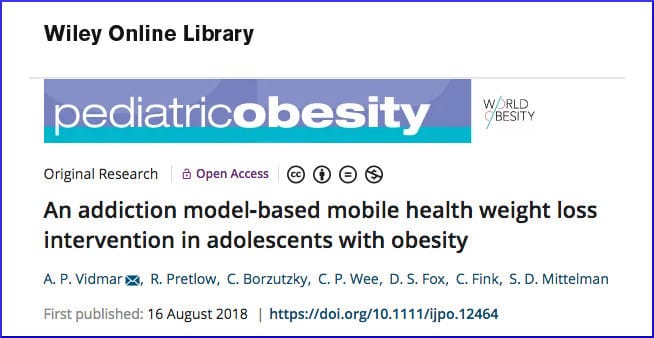
There is more to say about “An addiction model-based mobile health weight loss intervention in adolescents with obesity,” recently published in Pediatric Obesity. Children’s Hospital Los Angeles plays a vital role in this work, and Childhood Obesity News has featured CHLA in several posts. The study authors are A. P. Vidmar, R. Pretlow, C. Borzutzky, C. P. Wee, D. S. Fox, C. Fink, and S. D. Mittelman, and the work is also available as a PDF file.
We also discussed Energy Management for Personalized Weight Reduction, or EMPOWER, as well as the general efficacy of mobile health, or mHealth. Technology is catching up with imagination, and mobile devices can help people with everything.
The interesting thing about the W8Loss2Go program is that it works whether or not the user entertains a philosophical belief about the nature of addiction. To borrow a phrase from the most widespread recovery system of them all, “The program works if you work the program.” Belief isn’t necessary. All a person has to do is follow the instructions. What could be simpler?
One answer to that question
Actually, it could be simpler to work with a demographic other than 12- to 18-year-olds. While the kids involved in a study may be more compliant than their age-mates, when it comes to things like filling out applications, attending briefings, and weighing out food portions, they are still adolescents.
Kids at a certain age develop that so-familiar attitude that elders know nothing. Teenagers can tend to be service-resistant, meaning they don’t want to be messed with, not even for their own good — and especially by authority figures of any ilk.
“Society and civilization want to crush individuality and autonomy, and it starts right here, with some adult (who frankly may not be in such great shape himself or herself) telling me what to do.” Does that sound familiar? In every generation, a certain number of young people voice those rebellious thoughts, and a certain number of adults hear them expressed.
As always, motivation matters. A young person whose only interest is in losing pounds, may not get, and may not want to get, the nuanced proposition behind commitment to the plan. The real object is to become less attracted to the habit of eating to allay the emotional pains of life. But when people sense that freeing themselves from emotionally-motivated eating is going to take some effort, some expenditure of mental energy, other priorities suddenly arise.
Other team members
In a series called “Outstanding in Their Field,” Childhood Obesity News posts featured some of the many colleagues involved in this study. For each one, here are links and related keywords.
Alaina Phillips Vidmar, M.D.
Pediatric endocrinology; clinical trials; poster; investigation; randomized controlled trial
Claudia Borzutzky, M.D.
Family medicine; adolescent medicine; obesity medicine; multi-cultural; fitness; pediatrics; EMPOWER; diabetes; investigation
Steven Mittelman, M.D., Ph.D.
Diabetes; obesity; endocrinology; leukemia; fat cells
Your responses and feedback are welcome!
Source: “An addiction model-based mobile health weight loss intervention in adolescents with obesity,” OnlineLibrary.Wiley.com, 07/11/18
Image by Wiley Online Library

 FAQs and Media Requests:
FAQs and Media Requests: 











